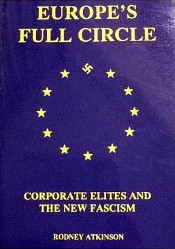By Professor Arthur Noble
The following statements by political stakeholders of the European Union at the time of the Lisbon Treaty (the biggest constitutional step ever to finish off democratic nations and establish the Euro-State) show conclusively that the EU in general and the Lisbon Treaty in particular were deliberately and carefully contrived to deprive individual nations of their sovereignty and merge them without their knowledge and with the most blatantly fascist means into a monolithic European superstate.
No further evidence is required to confirm that the peoples of Europe were shamelessly and systematically lied to by a consortium of dangerous schemers and madmen. I am grateful to the authors of the book The Nazi Roots of the ‘Brussels EU’ (Dr Rath Health Foundation, 2010) for locating the origin of these quotations. See also in particular Rodney Atkinson: The Nazis and Fascists who founded the EU and their influence today (http://freenations.net/video-the-nazis-and-fascists-who-founded-the-eu-and-their-influence-today) or his book “Fascist Europe Rising” page 44 – 58 to see the decades of openly admitted manipulations of people and democracies by the creators of today’s “Europe”.
Introduction RA: The EU’s proposed constitution was decisively voted down by France and the Netherlands. The Lisbon Treaty replaced it by avoiding some of the incriminating language but having the same effect. International law recognises that treaties signed on the basis of deception and manipulation are invalid. As Professor Noble rightly asserts, the EU politicians involved in misleading the voters should be exposed and prosecuted and the institutions of the European Superstate declared illegal.
Comparing the Lisbon Treaty with the rejected European Constitution:
“Public opinion will be led to adopt, without knowing it, the proposals that we dare not present to them directly. All the earlier proposals will be in the new text, but will be hidden and disguised in some way.”
Valéry Giscard D’Estaing, former French President and Chairman of the Convention which drew up the European Constitution; Le Monde, 14 June 2007, and Sunday Telegraph, 1 July 2007
“The substance of the constitution is preserved. That is a fact.”
German Chancellor Angela Merkel; speech in the European Parliament, 27 June 2007
“The good thing about not calling it a Constitution is that no one can ask for a referendum on it.”
Giuliano Amato, former Italian Prime Minister and Vice-Chairman of the Convention which drew up the European Constitution; speech at the London School of Economics, 21 February 2007
“The substance of what was agreed in 2004 (and rejected by referenda in France and Holland) has been retained. What is gone is the term ‘constitution’”.
Dermot Ahern, Irish Foreign Minister; Daily Mail Ireland, 25 June 2007
“Virtual incomprehensibility has thus replaced simplicity as the key approach to EU reform. As for the changes now proposed to be made to the constitutional treaty, most are presentational changes that have no practical effect. They have simply been designed to enable certain heads of government to sell to their people the idea of ratification by parliamentary action rather than by referendum.”
Dr Garret FitzGerald, former Irish Taoiseach; Irish Times, 30 June 2007
On whether they intended citizens to be able to understand it:
“They decided that the document should be unreadable. If it is unreadable, it is not constitutional, that was the sort of perception… Imagine the UK Prime Minister can go to the Commons and say: ‘Look, you see, it’s absolutely unreadable, it’s the typical Brussels treaty, nothing new, no need for a referendum.’ Should you succeed in understanding it at first sight there might be some reason for a referendum, because it would mean that there is something new.”
Giuliano Amato, former Italian Prime Minister and Vice-Chairman of the Convention which drew up the European Constitution; recorded by Open Europe, The Centre for European Reform, London, 12 July 2007
“The aim of the Constitutional treaty was to be more readable; the aim of this treaty is to be unreadable. The Constitution aimed to be clear, whereas this treaty had to be unclear. It is a success.”
Karel de Gucht, Belgian Foreign Minister; Flandreinfo, 23 June 2007
On the Irish voting ‘no’ to the Treaty in 2008:
“All of the [political leaders] know quite well that if the similar question was put to their electorate by a referendum, the answer in 95 per cent of the countries would probably have been ‘no’ as well.”
Charlie McCreevy, Irish EU Commissioner; Irish Times, 27 June, 2009
On the French voting ‘no’ to the European Constitution (with which the Treaty shares 96 percent of its content) in 2005:
“France was just ahead of all the other countries in voting ‘no’. It would happen in all Member States if they have a referendum. There is a cleavage between people and governments. A referendum now would bring Europe into danger. There will be no Treaty if we had a referendum in France, which would again be followed by a referendum in the UK.”
French President Nicolas Sarkozy, speaking at a meeting of senior MEPs; The Economist, 14 November 2007
On stripping power and sovereignty away from the People:
“I don t think it is a good idea to replace this slow and effective method – which keeps national States free from anxiety while they are being stripped of power – with great institutional leaps. Therefore I prefer to go slowly, to crumble pieces of sovereignty up little by little, avoiding brusque transitions from national to federal power. That is the way I think we will have to build Europe’s common policies.”
Italian Prime Minister Giuliano Amato, before he became Vice-President of the EU Constitutional Convention; interview with Barbara Spinelli, La Stampa, 13 July 2000
FOR THE HISTORY OF THE DESTRUCTION OF DEMOCRATIC NATIONS BY THE EU SEE “BOOKS” AT THE TOP OF THIS PAGE


















